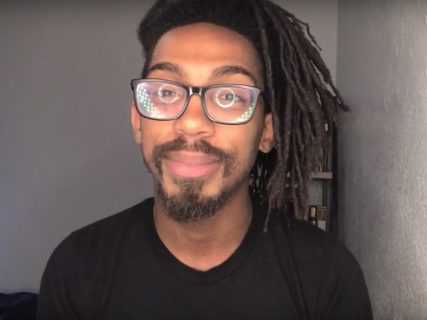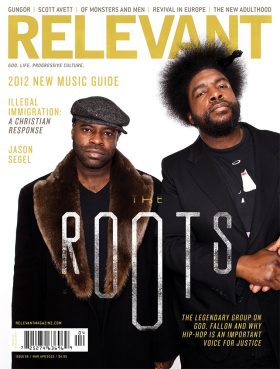
by Adelle M. Banks and Jack Jenkins, RNS | Sep 21, 2019 | Headline News |

Cameron Strang, the founder and CEO of Relevant Media Group, found himself under attack from a host of former employees this week who accused him of behavior they said was racially insensitive and changed depending on his mood.
Relevant Media publishes a Christian bimonthly geared toward young evangelicals, as well as a website and a network of podcasts.
It was the allegation of racial insensitivity that came in a Twitter barrage on Wednesday (Sept. 18) after Relevant recommended a podcast episode about race and the church on the social media platform.
In reply, Andre Henry, an African American writer who served as Relevant’s managing editor from October 2017 through July 2018, shot back: “Several experiences & stories from my time at @RELEVANT … convince me the org is not committed at all to creating an antiracist culture internally to produce a race podcast with integrity.
“Nor do they honor Black people,” he added.
Henry followed his tweet with a blog post on Medium, titled “Black Christians Deserve Better Than Companies (And Churches) Like Relevant Media Group.”
“The company is in need of the very information they wish to publish for others,” Henry wrote.

Recent Relevant magazine covers. Screengrabs
Henry’s retorts spurred a stream of online testimonies from people who used to work for Strang, both African American and white, men and women, who registered indignation about what some called a toxic environment that they say Strang created. They described a workplace in which Strang exhibited various levels of high-handedness, shouting fits and racially insensitive slights.
On its website Friday (Sept. 20), Relevant issued a statement, headlined, “RELEVANT’s Stand on Racial Justice,” explaining that the magazine had reached out to Henry to apologize.
“In our conversations with him,” the statement said, “he discussed ways we could improve our corporate culture, and based on his insights, we are looking into options to continue improving and create systems to ensure every member of our team has a positive experience.”
After the statement brought further criticism over the course of the day, Strang appeared to delete his Twitter account.
In an interview with Religion News Service, Henry, who now works for Evangelicals for Social Action and hosts a podcast called “Hope and Hard Pills,” described Relevant’s office culture as not outright hostile to people of color — “no one’s using racial slurs,” he said — and added the staff included a range of writers.
But he said that the company’s commitment to diversity was more cosmetic than genuine.

Andre Henry. Video screengrab
“They have done well at appearing to be about racial justice,” said Henry. “They post the right things. They say the right things. They make sure that they have a good mix of people of color in the magazine and on the web, but I don’t think that in their practices as an organization that they honor people of color in that way.”
In his blog post, Henry said the beginning of the end of his tenure at Relevant came after a run-in he had with Strang over coverage of Black History Month.
Henry had planned a month’s worth of content related to the topic, but Strang reportedly warned him not to “waste editorial energy” and complained the site would have to post seven or eight articles each day online to “offset” one article about race, he said.
Not long afterward, Henry wrote, he was “stripped of all decision-making power.”
While he kept his title as managing editor, responsibility for web articles was given to the outlet’s brand manager and articles in the magazine to its contributing editor.

The March/April 2012 issue of Relevant, featuring The Roots on its cover. Screengrab
Ryan Hamm, who worked at Relevant as an editor and managing editor from 2009 to 2012, told Religion News Service of an incident in which members of the editorial staff, including Strang, were discussing the poor newsstand sales of an issue of the magazine that featured an image of the band The Roots on the cover.
“(Strang) said, as I recollect, ‘Well maybe our audience doesn’t want to see scary black men on the cover of Relevant,’” said Hamm, who is now employed at a nonprofit that fights religious persecution. “As soon as he said that, (I thought), ‘If that’s true, then I have no interest in writing for this audience, and I’m done.’”
Rebecca Flores, who preceded Henry as managing editor and whose pen name is Rebecca Marie Jo, wrote in a blog post published Friday that Henry’s post validated her own experiences.
She recounted a meeting in which Strang suggested running an image of a black Christian rapper with a noose around his neck as a “shocking image to symbolize his lynching by white evangelical America” after the rapper was criticized for his support of the Black Lives Matter movement.
Flores, who is Latina, said that she told Strang that she found the idea deeply troubling and offensive.
“Listen. I’m telling you, as a person of color, that if I was reading this magazine, whoa is not the reaction I would have. I would be deeply disturbed. And alienated,” she said. “We do not need to publish an image of a Black man in a noose. This isn’t a good idea.”
Flores said the incident made her feel “like I was in a trap I wouldn’t get out of safely.”
She said Strang “was obviously annoyed with me, and I left trying to hide my exhaustion towards this environment.”
RNS reached out to Strang for comment and to corroborate accounts from former staffers, but he did not immediately respond.
Strang, the son of Charisma magazine publisher Stephen Strang, founded Relevant Media Group in Orlando, Florida, in 2000, when he was 24 years old. As hip as his father’s magazine was religiously conservative, the sleekly designed magazine and website heralded unorthodox Christian heroes from the rock and literary world such as Bob Dylan and the rock band U2, about whom the publishing enterprise also issued adulatory spiritual and musical biographies.
Offering a glimpse of God in popular culture, Relevant’s magazine alone claimed a readership of more than 100,000 by the mid-2000s and had become a guide to navigating mainstream American culture for a generation of young Christian adults venturing out of the evangelical bubble.
But the publication wanted to “avoid taking any strong stances that may be polarizing,” Henry wrote on Medium. And, he believed, it catered to its “mostly white, male, conservative-leaning base.”
“It’s just not for us. We’re welcome to partake, but this is white content for white people,” Henry wrote.
Reviews of Relevant Media Group on Glassdoor, which publishes job listings and company reviews, also hint at issues within the company.
In a one-star review from June 2019, an anonymous user who identified themself as an employee who worked there less than a year, described the outlet’s “work culture” as the “most toxic I’ve ever worked in” and noted the high turnover of staff.
Another review from a user who said they are a current employee who has worked at the company for more than three years gives the outlet four stars, but expressed concerns about Relevant’s leadership.
“The CEO can be erratic, sometimes irrational (especially with female employees) and is very stubborn about everything. He is very controlling, and everything must go through him,” the review said.
Henry said he hopes Relevant’s response can be a teachable moment for evangelical organizations.
“I think that all evangelical institutions who see this, they can be looking to see what to do or not to do depending on how well Relevant doesn’t just listen to me but listens to all the other people that are chiming in,” he said.
Hamm and others were quick to celebrate the work of Relevant as a whole and pinned their frustrations specifically on Strang. Even though he used terms such as “spiritual abuse” to describe his former boss’s behavior, Hamm insisted he remained proud of the work he produced at the magazine.
“Besides Cameron, it would have been the best job I’ve ever had,” Hamm said.
by Crystal Marie Grant | Apr 25, 2012 | Feature, Headline News |

MOURNING THEIR LOSS: Afghan men gather in the Panjwayee district of Kandahar for a memorial ceremony for the victims killed by a rogue U.S. soldier on March 11. (Photo: I. Sameem/Newscom)
As Christians, we believe every life has value. We believe every life represents a soul, and that Jesus is no respecter of persons (Acts 10:34). Despite external circumstances, God shows no partiality to anyone; he loves us all equally.
But what about us? Are we “respecters of persons”? Do show favoritism? Are we prejudiced? Our actions often indicate something altogether different than what we’re called to as people of faith.
Imagine this:
It is nightfall. You’ve just finished saying prayers with your family and putting your three kids to bed, and you and your spouse are in your own bed. Life hasn’t been especially kind to you and you are no stranger to death and loss, but it seems that things in your village are finally settling down. You drift off to sleep, not realizing that you will never wake up. You don’t know that your spouse will not wake up. And worst of all, your precious small children, innocent in their youth, filled with promise and aspirations, will never wake up.
A soldier from another country has slipped out under the cover of night and murdered you and your family, along with others — a total of 17 people — in an act that even he can’t explain.
One must believe that, worldwide, there is outrage. There are protests, and there is a plan to address this massacre of innocent human beings. After all, you’re just like most citizens of the world; you aren’t fighting in a war. You’re in your own home. The world is full of good people, who must certainly shudder when thinking of this tragedy, right? Surely, people of all faiths, including Christians, were heartbroken over the crime and took swift action to ensure that these types of acts don’t happen again … Right?
After hearing of the massacre of 17 Afghan civilians, 9 of whom were children, my heart sank. I expected outrage from folks across the world. I expected that the American soldier guilty of the crime would be castigated by millions of people; I expected that churches and several prominent organizations would demand justice for the lives of those lost.
But I heard little. The mass killing occurred on March 11, 2012, and aside from a few reports on NPR, and an initial investigation from major media outlets, the story has been all but forgotten.
The few stories still revolving around the murders are examining whether or not the soldier is suffering from post dramatic stress disorder (PTSD) and the psychological dangers of multiple overseas tours. It’s certainly important to have concern for the mental health of our soldiers, but somehow in the spin of the news cycle, those 17 innocent Afghans have been conveniently moved to the background.
A few weeks earlier, back in the Western Hemisphere, another shooting occurred. By now, everyone’s at least moderately familiar with the circumstances surrounding the tragic death of Trayvon Martin. George Zimmerman, a self-appointed neighborhood watch captain spotted Trayvon walking around their gated neighborhood, decided he looked suspicious, and reported him to the local police. While the 911 calls are recorded, other details are murky. We do know that Zimmerman followed Trayvon at least for some time, there was some type of scuffle, and in the end, 17-year-old, unarmed Trayvon Martin lay dead and Zimmerman alleges that he killed Trayvon in self-defense.
The news circulated throughout the Black community, largely due to social media, and within a few weeks was picked up by major media outlets. And once it was picked up, there was no stopping the provocative story. In a matter of days, everyone had some type of understanding of the Stand Your Ground Law, Zimmerman’s background, Martin’s background, and everyone had an opinion on it. Many people, including our President, have alluded that Trayvon could be their son or brother. Celebrities took to Twitter to comment on the saga. People updated their Facebook profiles with images of themselves in hoodies. On blogs and websites, people have argued passionately that Martin was a martyr and Zimmerman a racist, or that Martin was a thug and Zimmerman a hero. We’ve analyzed and asked questions about this case from every angle, and for good reason. A young, unarmed man has been killed and it’s possible that race was a motivating factor.

UNFATHOMABLE TRAGEDY: The bodies of an elderly Afghan man and a small child are pictured in Alkozai village in Kandahar. They were two of the 17 people massacred on March 11. (Photo: Mamoon Durrani/Newscom)
And yet … 17 citizens in what seems like a faraway land are dead. We are silent.
Humans are wired to empathize with people who are like themselves. As Americans, it is understandable that we are most concerned about what goes on in the lives of Americans. But what about our role as Christians?
The divides created by nationalities and various faiths should matter infinitely less once we decide to follow Jesus. Do we think Jesus wept more for Trayvon than for those families in Afghanistan? Do we really believe Jesus has a special place in his heart for people from a particular part of the map? Does Jesus care more for those who are dark brown than those who are light brown?
The answer is clear. The Bible verse says, “God so loved the world.”
Just as Jesus’ love is unconditional and inclusive of everyone, so should ours be. The Black community has done an excellent job in addressing what many believe is injustice in the killing of Trayvon Martin. After all, it’s relatively easy to support a cause when you believe that you could be the next victim.
What we need to work on is our ability to address injustices against people who may not look like us, or worship like us, or live next door to us. The very thing many are accusing George Zimmerman of doing — prejudging another human being based on stereotypes — is what we do when turn a blind eye to suffering that doesn’t feel personal.
by Christine A. Scheller | Jan 3, 2012 | Feature, Headline News |
— As Republican presidential candidates make their final pitches to the 41 percent of “likely caucusgoers” who are still undecided, charges of bigotry are flying. Here’s a breakdown:
As Republican presidential candidates make their final pitches to the 41 percent of “likely caucusgoers” who are still undecided, charges of bigotry are flying. Here’s a breakdown:
Evangelicals Oppose Romney’s Faith; He Opposes Dream Act
Republican front-runner Mitt Romney faces prejudice in Iowa from evangelicals who are “suspicious” of his Mormon faith, The Washington Post reports, and Romney himself risks alienating Latino voters with his promise to veto the Dream Act for everyone except those who serve in the military. The act would conditionally allow undocumented immigrants who entered the country under the age of 16 to be eligible for legal status.
Santorum Opposes Gays; Journalist Opposes Him and the ‘Jesus Freaks’ Who Support Him
Meanwhile, social conservatives are rallying behind former Pennsylvania senator Rick Santorum, even disillusioned ones like Chris La Tondresse, founder and CEO of an organization called Recovering Evangelical. In a column at CNN.com, La Tondresse said “there’s no questioning Santorum’s social conservative bona fides,” but “more than any other Republican candidate (and even more than some Democrats), Santorum speaks openly and passionately about his concern for poor and vulnerable people in the U.S. and around the world.”
David Brooks concurred at The New York Times, saying the working class raised Santorum “goes out of his way in his speeches to pick fights with the ‘supply-siders,'” “scorns the Wall Street bailouts,” and couches his economic arguments as “values arguments” that root “long-term competitiveness” in strong families and “wholesome communities.”
This is where Santorum gets in trouble with folks like Michelangelo Signorile, editor-at-large for The Huffington Post’s Gay Voices channel. Signorile said Santorum, who opposes same-sex marriage, wants to “forcibly” break up those marriages, giving “‘special privileges’ to people based on sexual orientation.” And, at Buzzfeed, Andrew Kaczynski reminds readers that in January 2011, Santorum said President Obama should oppose abortion because he is black.
Ron Paul Opposes the Civil Rights Act, Can’t Escape Racist Newsletters
The bigotry discussion that has dominated the race lately, however, is all about U.S. Congressman Ron Paul—specifically his opposition to the Civil Rights Act of 1964 and his connection to racist newsletters published under his byline in the 1980s and 1990s.
At Salon, Michael Lind succinctly said that “by equating the Civil Rights Act, which expanded American civil liberty, with the Patriot Act, which reduced it, on the grounds that both are federal laws with sanctions, Ron Paul displays the moral idiocy of someone who declares that a person who pushes a little old lady out of the path of a bus is just as bad as a person who pushes a little old lady into the path of a bus, because both are equally guilty of pushing little old ladies around.”
“It certainly is possible that Ron Paul never read [the] publications produced in his own name, just as it’s possible to sincerely believe that the Civil Rights Act destroyed personal liberties, and it’s possible to sincerely believe that if you are going to vote, you should be able to read the names of the candidates, or that Lincoln destroyed the original values of the republic. But it’s also true that those beliefs have long been used to shield more odious ones,” said Ta-Nehisi Coates at The Atlantic.
Calling Out the Watchdogs?
Finally, while The Week offered five theories as to why the Iowa caucuses are important, New York Times columnist Gail Collins said they’re not. “On Tuesday, there will be a contest to select the preferred candidate of a small group of people who are older, wealthier and whiter than American voters in general, and more politically extreme than the average Iowa Republican,” said Collins, with nary a hint of bias.
Perhaps she should read Get Religion, where media critic Mollie Hemmingway turned the spotlight back on journalists by excoriating University of Iowa journalism professor Stephen G. Bloom for writing an apparent diatribe in The Atlantic that allegedly characterized Iowans as “uneducated Jesus freaks.” Hemmingway reported that both Columbia Journalism Review and The Associated Press also came down heavy on Bloom and The Atlantic.
What Do You Think?
Is bigotry an important issue in the 2012 race or is it a distraction?








 As Republican presidential candidates make their
As Republican presidential candidates make their